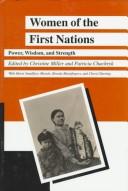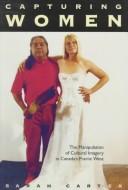| Listing 1 - 10 of 29 | << page >> |
Sort by
|

ISBN: 1283091429 9786613091420 0887553966 9780887553967 0887556345 9780887556340 0887551610 9780887551611 9781283091428 6613091421 Year: 1996 Publisher: Winnipeg, Man. University of Manitoba Press
Abstract | Keywords | Export | Availability | Bookmark
 Loading...
Loading...Choose an application
- Reference Manager
- EndNote
- RefWorks (Direct export to RefWorks)
"From diversity comes strength and wisdom": this was the guiding principle for selecting the articles in this collection. Because there is no single voice, identity, history, or cultural experience that represents the women of the First Nations, a realistic picture will have many facets. Accordingly, the authors in Women of the First Nations include Native and non-Native scholars, feminists, and activists from across Canada.Their work examines various aspects of Aboriginal women's lives from a variety of theoretical and personal perspectives. They discuss standard media representations, as well as historical and current realities. They bring new perspectives to discussions on Aboriginal art, literature, historical, and cultural contributions, and they offer diverse viewpoints on present economic, environmental, and political issues.This collection counters the marginalization and silencing of First Nations women's voices and reflects the power, strength, and wisdom inherent in their lives.
Indian women --- Women, Indian --- Women --- Femmes autochtones --- Native women --- Congrès --- Congresses
Book
ISBN: 1283712636 0252094263 9780252094262 9780252037153 9780252078682 0252037154 9781283712637 0252078683 Year: 2012 Publisher: Urbana
Abstract | Keywords | Export | Availability | Bookmark
 Loading...
Loading...Choose an application
- Reference Manager
- EndNote
- RefWorks (Direct export to RefWorks)
These essays create a transnational and comparative dialogue on the history of the productive and reproductive lives and circumstances of Indigenous women from the late 19th century to the present in the United States, Australia, New Zealand/Aotearoa, and Canada.
Indigenous women --- Aboriginal women --- Native women --- Women --- Employment. --- Employment --- E-books --- Economic conditions.

ISBN: 0773516565 Year: 1997 Publisher: Montreal : McGill-Queen's university press,
Abstract | Keywords | Export | Availability | Bookmark
 Loading...
Loading...Choose an application
- Reference Manager
- EndNote
- RefWorks (Direct export to RefWorks)
Indian captivities --- Indian women --- Race discrimination --- Women, White --- Native women --- History --- History.
Book
ISBN: 1772581453 9781772581454 1772581356 Year: 2017 Publisher: Bradford, Ont. Demeter Press
Abstract | Keywords | Export | Availability | Bookmark
 Loading...
Loading...Choose an application
- Reference Manager
- EndNote
- RefWorks (Direct export to RefWorks)
Traditional midwifery, culture, customs, understandings, and meanings surrounding pregnancy and birth are grounded in distinct epistemologies and worldviews that have sustained Indigenous women and their families since time immemorial. Years of colonization, however, have impacted the degree to which women have choice in the place and ways they carry and deliver their babies. As nations such as Canada became colonized, traditional gender roles were seen as an impediment. The forced rearrangement of these gender roles was highly disruptive to family structures. Indigenous women quickly lost their social and legal status as being dependent on fathers and then husbands. The traditional structures of communities became replaced with colonially informed governance, which reinforced patriarchy and paternalism. The authors in this book carefully consider these historic interactions and their impacts on Indigenous women's experiences. As the first section of the book describes, pregnancy is a time when women reflect on their bodies as a space for the development of life. Foods prepared and consumed, ceremony and other activities engaged in are no longer a focus solely for the mother, but also for the child she is carrying. Authors from a variety of places and perspectives thoughtfully express the historical along with contemporary forces positively and negatively impacting prenatal behaviours and traditional practices. Place and culture in relation to birth are explored in the second half of the book from locations in Canada such as Manitoba, Ontario, British Columbia, the Northwest Territories, and Aotearoa. The reclaiming and revitalization of birthing practices along with rejuvenating forms of traditional knowledge form the foundation for exploration into these experiences from a political perspective. It is an important part of decolonization to acknowledge policies such as birth evacuation as being grounded in systemic racism. The act of returning birth to communities and revitalizing Indigenous prenatal practices are affirmation of sustained resilience and strength, instead of a one-sided process of reconciliation.This book makes a compelling contribution to the field of Indigenous and maternal studies. The editors have put together a powerful collection that honours the spirit of pregnancy and birth, and the strength and resilience of Indigenous women and families. By acknowledging the ceremony of birth in relation to contemporary Indigenous issues, such as forced evacuation and water protection, the editors contextualize the layers of meaning embedded in returning birth to Indigenous communities. This book serves as an expression of the creative acts of resistance that have always defined Indigenous motherhood.
Indigenous women --- Pregnancy --- Gestation --- Conception --- Physiology --- Reproduction --- Aboriginal women --- Native women --- Women --- Social life and customs. --- Social aspects.
Book
ISBN: 1897425821 9786612977862 189742583X 1282977865 9781926836324 9781897425831 1926836324 9781897425824 Year: 2011 Publisher: Edmonton, Alberta : AU Press,
Abstract | Keywords | Export | Availability | Bookmark
 Loading...
Loading...Choose an application
- Reference Manager
- EndNote
- RefWorks (Direct export to RefWorks)
Recollecting is a rich collection of essays that illuminates the lives of late-eighteenth-century to mid-twentieth century Aboriginal women, who have been overlooked in sweeping narratives of the history of the West. Some essays focus on individuals-a trader, a performer, a non-human woman. Other essays examine cohorts of women-wives, midwives, seamstresses, nuns. Authors look beyond the documentary record and standard representations of women, drawing on records generated by the women themselves, including their beadwork, other material culture, and oral histories.
Indian women --Canada --History. --- Indian women --- Gender & Ethnic Studies --- Social Sciences --- Ethnic & Race Studies --- History --- History. --- Women, Indian --- Women --- Indigenous women --- Aboriginal women --- Native women
Book
ISBN: 088755430X 9780887554308 0887554326 9780887554322 9780887557385 0887557384 9781306906661 1306906660 Year: 2014 Publisher: Winnipeg
Abstract | Keywords | Export | Availability | Bookmark
 Loading...
Loading...Choose an application
- Reference Manager
- EndNote
- RefWorks (Direct export to RefWorks)
Based on a range of sources including the records of the Departments of Indian Affairs and National Health and Welfare, interviews. print, and media, McCallum shows how state-run education and placement programs were part of Canada's larger vision of assimilation and extinguishment of treaty obligations. Conversely, she also shows how Indigenous women link these same programs to their social and cultural responsibilities of community building and state resistance.
Native women --- Economic conditions --- Social conditions --- Employment --- History --- Canada --- Indian women --- Women, Indian --- Women --- indigenous women, domestic servants, education, assimilation, beauty culture, activism.
Book
ISBN: 1926452364 9781926452364 9781926452357 1926452356 9781927335451 1927335450 Year: 2014 Publisher: Demeter Press
Abstract | Keywords | Export | Availability | Bookmark
 Loading...
Loading...Choose an application
- Reference Manager
- EndNote
- RefWorks (Direct export to RefWorks)
The voices of Indigenous women world-wide have long been silenced by colonial oppression and institutions of patriarchal dominance. Recent generations of powerful Indigenous women have begun speaking out so that their positions of respect within their families and communities might be reclaimed. The book explores issues surrounding and impacting Indigenous mothering, family and community in a variety of contexts internationally. The book addresses diverse subjects, including child welfare, Indigenous mothering in curriculum, mothers and traditional foods,
Motherhood. --- Mothers --- Indigenous women --- Aboriginal women --- Native women --- Women --- Moms --- Parents --- Housewives --- Motherhood --- Pregnant women --- Maternity --- Parenthood --- Social conditions. --- Sociology of the family. Sociology of sexuality
Book
Year: 2021 Publisher: [Washington, D.C.] : United States Government Accountability Office,
Abstract | Keywords | Export | Availability | Bookmark
 Loading...
Loading...Choose an application
- Reference Manager
- EndNote
- RefWorks (Direct export to RefWorks)
Alaska Native women --- Indian women --- Indigenous women --- Missing persons --- Murder victims --- Violence against --- Prevention. --- Databases. --- Investigation --- United States. --- Rules and practice.
Book
ISBN: 1771990414 1771990430 1771990422 9781771990424 9781771990431 9781771990448 1771990449 9781771990417 Year: 2016 Publisher: Edmonton, Alta Au Press
Abstract | Keywords | Export | Availability | Bookmark
 Loading...
Loading...Choose an application
- Reference Manager
- EndNote
- RefWorks (Direct export to RefWorks)
An extensive body of literature on Indigenous knowledge and ways of knowing has been written since the 1980's. This research has for the most part been conducted by scholars operating within Western epistemological frameworks that tend not only to deny the subjectivity of knowledge but also to privilege masculine authority. As a result, the information gathered predominantly reflects the types of knowledge traditionally held by men, yielding a perspective that is at once gendered and incomplete. Even those academics, communities, and governments interested in consulting with Indigenous peoples for the purposes of planning, monitoring, and managing land use have largely ignored the knowledge traditionally produced, preserved, and transmitted by Indigenous women. While this omission reflects patriarchal assumptions, it may also be the result of the reductionist tendencies of researchers, who have attempted to organize Indigenous knowledge so as to align it with Western scientific categories, and of policy makers, who have sought to deploy such knowledge in the service of external priorities. Such efforts to apply Indigenous knowledge have had the effect of abstracting this knowledge from place as well as from the world view and community—and by extension the gender—to which it is inextricably connected. Living on the Land examines how patriarchy, gender, and colonialism have shaped the experiences of Indigenous women as both knowers and producers of knowledge. From a variety of methodological perspectives, contributors to the volume explore the nature and scope of Indigenous women’s knowledge, its rootedness in relationships both human and spiritual, and its inseparability from land and landscape. From the reconstruction of cultural and ecological heritage by Naskapi women in Québec to the medical expertise of Métis women in western Canada to the mapping and securing of land rights in Nicaragua, Living on the Land focuses on the integral role of women as stewards of the land and governors of the community. Together, these contributions point to a distinctive set of challenges and possibilities for Indigenous women and their communities.
Indigenous women. --- Place (Philosophy) --- Philosophy --- Aboriginal women --- Native women --- Women --- Treaties --- Arctic Studies --- Inuit --- United Nations --- Women's Studies --- Land Claims --- Nicaragua --- Feminist criticism --- Indigenous population --- Land ownership --- Patriarchy --- Sexism --- Food --- Images of women --- Book --- Ecology
Book
ISBN: 1772580651 9781772580679 1772580678 9781772580655 9781772580204 1772580201 Year: 2016 Publisher: Bradford, ON
Abstract | Keywords | Export | Availability | Bookmark
 Loading...
Loading...Choose an application
- Reference Manager
- EndNote
- RefWorks (Direct export to RefWorks)
Indigenous women --- Women --- Girls --- Missing persons --- Murder victims --- Murderees --- Victims of murder --- Dead --- Victims of crimes --- Persons --- Children --- Females --- Young women --- Human females --- Wimmin --- Woman --- Womon --- Womyn --- Human beings --- Femininity --- Aboriginal women --- Native women --- Violence against
| Listing 1 - 10 of 29 | << page >> |
Sort by
|

 Search
Search Feedback
Feedback About UniCat
About UniCat  Help
Help News
News